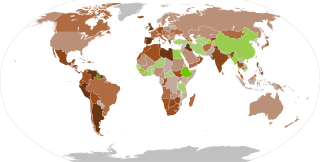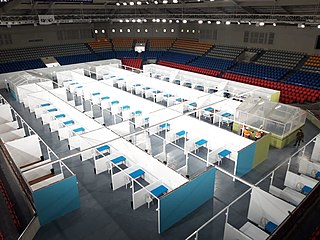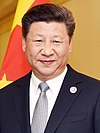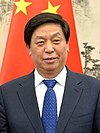
The premier of China, officially titled the premier of the State Council of the People's Republic of China, is the head of government of China and leader of the State Council. This post was established in 1911 near the end of the Qing dynasty, but the current post dates to 1954, five years after the establishment of the PRC. The premier is the second-highest ranking person in China's political system after the general secretary of the Chinese Communist Party /president, and holds the highest rank in the civil service of the central government.

The Standing Committee of the National People's Congress (NPCSC) is the permanent body of the National People's Congress (NPC), the national legislature of the People's Republic of China. It exercises the powers of the NPC when it is not in session.
The orders of precedence in China is the ranking of political leaders in China for the purposes of event protocol and to arrange the ordering of names in official news bulletins, both written and televised. It is also sometimes used to assess perceived level of political power. Although there is no formally published ranking, there is usually an established convention and protocol, and the relative positions of Chinese political figures can usually be deduced from the order in meetings and especially by the time and order in which figures are covered by the official media. Since 1982, the General Secretary of the Chinese Communist Party has been the highest-ranking official in the People's Republic of China (PRC).

Li Keqiang was a Chinese economist and politician who served as the premier of China from 2013 to 2023. He was also the second-ranked member of the Politburo Standing Committee of the Chinese Communist Party (CCP) from 2012 to 2022. Li was a major part of the "fifth generation of Chinese leadership" along with Xi Jinping, the CCP general secretary.

MWC Barcelona is an annual trade show dedicated to the mobile communications industry.

The National People's Congress (NPC) is the highest organ of state power of the People's Republic of China. The NPC is the only branch of government in China, and per the principle of unified power, all state organs from the State Council to the Supreme People's Court (SPC) are subservient to it. With 2,977 members in 2023, it is the largest legislative body in the world. The NPC is elected for a term of five years. It holds annual sessions every spring, usually lasting from 10 to 14 days, in the Great Hall of the People on the west side of Tiananmen Square in Beijing.

The Two Centenaries is a political slogan that refers to two 100-year anniversaries and a stated set of economic and political goals advanced by General Secretary Xi Jinping following the 18th National Congress of the Chinese Communist Party (CCP) held in 2012. The Chinese government describes the Two Centenaries as the basic foundation for achieving the "Chinese Dream".

The 13th National People's Congress (NPC) was elected from October 2017 to February 2018 and was in session in the five-year period from 2018 to 2023. It held five sessions in this period, occurring around early March every year until before 2023, when the 14th National People's Congress first convened.
The Integrated Review of Security, Defence, Development and Foreign Policy, often known as the Integrated Review, and titled as Global Britain in a Competitive Age, was a review carried out by the British government led by Boris Johnson into the foreign, defence, security and international development policies of the United Kingdom. Described by Johnson as "the largest review of its kind since the Cold War", the review was published on 16 March 2021.

The COVID-19 pandemic caused the most significant disruption to the worldwide sporting calendar since World War II. Across the world and to varying degrees, sports events were cancelled or postponed. The 2020 Summer Olympics in Tokyo were rescheduled to 2021. At the time, spectators had no games to watch and players no games to play. Only a few countries and territories—such as Hong Kong, Turkmenistan, Belarus, and Nicaragua—continued professional sporting matches as planned.

The COVID-19 recession was a global economic recession caused by COVID-19 lockdowns. The recession began in most countries in February 2020. After a year of global economic slowdown that saw stagnation of economic growth and consumer activity, the COVID-19 lockdowns and other precautions taken in early 2020 drove the global economy into crisis. Within seven months, every advanced economy had fallen to recession.

The video game industry has been substantially impacted by COVID-19 pandemic restrictions in various ways, most often due to concerns over travel to and from China or elsewhere, and delays in the manufacturing processes within China.

The COVID-19 pandemic has impacted the tourism industry due to the resulting travel restrictions as well as slump in demand among travelers. The tourism industry has been massively affected by the spread of coronavirus, as many countries have introduced travel restrictions in an attempt to contain its spread. The United Nations World Tourism Organization estimated that global international tourist arrivals could have decreased by 58% to 78% in 2020, leading to a potential loss of US $0.9–1.2 trillion in international tourism receipts.
The 2019 National People's Congress, or the Second Session of the 13th National People's Congress, was held in March 2019 at the Great Hall of the People in Beijing, China. The session opened on 8 March and concluded on 20 March. Major state positions were elected in this session.
The 2020 National People's Congress was the Third Plenary Session of the 13th National People's Congress. It was held from Friday 22 to 28 May, concurrently with the Chinese People's Political Consultative Conference (CPPCC) as part of the annual Two Sessions. It was originally scheduled to be held in March 2020 at the Great Hall of the People in Beijing, China, however due to the global COVID-19 pandemic, it had been delayed until May.

The COVID-19 pandemic caused far-reaching economic consequences including the COVID-19 recession, the second largest global recession in recent history, decreased business in the services sector during the COVID-19 lockdowns, the 2020 stock market crash, the impact of COVID-19 on financial markets, the 2021–2023 global supply chain crisis, the 2021–2023 inflation surge, shortages related to the COVID-19 pandemic including the 2020–present global chip shortage, panic buying, and price gouging. The pandemic led to governments providing an unprecedented amount of stimulus, and was also a factor in the 2021–2022 global energy crisis and 2022–2023 food crises.

The COVID-19 pandemic had a significant impact on the conduct of sports in the Philippines affecting both competitive sports leagues and tournaments and recreational sports.

The COVID-19 pandemic has caused disruption to basketball around the world, mirroring its impact across all sports. Around the world and to varying degrees, events and competitions have been cancelled or postponed with limited or no spectators, and other restrictions in 2020 and 2021. The National Basketball Association (NBA) suspended its 2019–20 season due to one player testing positive from COVID-19, and began to resume the season later in 2020.

The 14th National People's Congress (NPC) is the sitting electoral term of the "supreme organ of state power" of the People's Republic of China. It convened in Beijing, on 5 March 2023, and is scheduled to continue until March 2028. Elections for the new Congress were held from October 2022 to February 2023. It is scheduled to hold five sessions in this period, occurring around early March every year until before 2028, when the 15th National People's Congress is expected to be elected from December 2027 to February 2028 and will likely be in session around March 2028.
The 2024 National People's Congress (NPC) was the Second Plenary Session of the 14th National People's Congress of the People's Republic of China (PRC). It was held from 5 March to 11 March 2024, concurrently with the Chinese People's Political Consultative Conference (CPPCC) as part of the annual Two Sessions. The NPC was held at the Great Hall of the People in Beijing.









